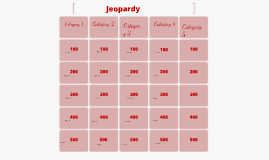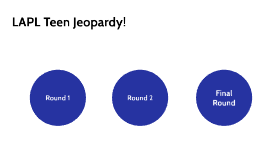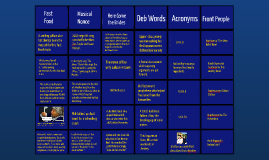Jeopardy Template
Transcript: The Game of Thrones t.v. show was inspired by this book What is a password? The President of The United States of America What does team DRAG stand for? Stone, Chamber, Prisoner, Goblet, Phoenix, Prince, Hallows Movement/idealogies that promote equality for women "It is no more radical for a girl to fall in love with mathematics or basketball than to fall in love with another girl" This includes things such as sending hurtful text messages or emails, or setting up a hate group on a social networking site. "We hold these truths to be self-evident: that all men are created equal; that they are endowed by their Creator with certain unalienable rights; that among these are life, liberty, and the pursuit of happiness." What is cyber bullying? In 2008, California's Proposition __ posed to eliminate gay marriage, but was eventually deemed unconstitutional An expression of objection against an organization promoting an idea or law. At the 2014 Oscars, John Travolta introduced Idina Menzel as ____, creating a huge viral faux pas Did somebody call the geek squad? "I have borne thirteen children, and seen most all sold off to slavery, and when I cried out with my mother's grief, none but Jesus heard me! And ain't I a woman?" What is "netiquette". Support for gay marriage decreases roughly after this age TBTN The labelization as a man or woman at birth AAUW In the Daily News Type of sexuality within the same sex HRC OMG!!!.. Utah was the __th state to legalize gay marriage “I am very disappointed an activist federal judge is attempting to override the will of the people of Utah. I am working with my legal council and the acting Attorney General to determine the best course to defend traditional marriage within the borders of Utah.” 2015's Batman Of U.S. Citizens, approximately ___ of 6 citizens support gay marriage __ of 3 justices refused to stay Shelby's decision in the 10th circuit's hearing of parent's roles in child-rearing Got Game? Highest Grossing Animated Film in History "You'll be coming home with me tonight And we'll be burning up like neon lights" The online equivilant of having good manners, or being polite - in other words, using proper "etiquette". Openly gay talk show host; 2014 Oscars host "It's a victory for all transgender people to know that we have a voice, that we have recourse, and that when it comes to workplace protections we deserve to make a living" Manners Much? "I got ______, ain't nobody got time fo' dat" M.Y.O.B. EEOC A first line of online defence against intruders and imposters - usually consisting of at least 8 characters.

















